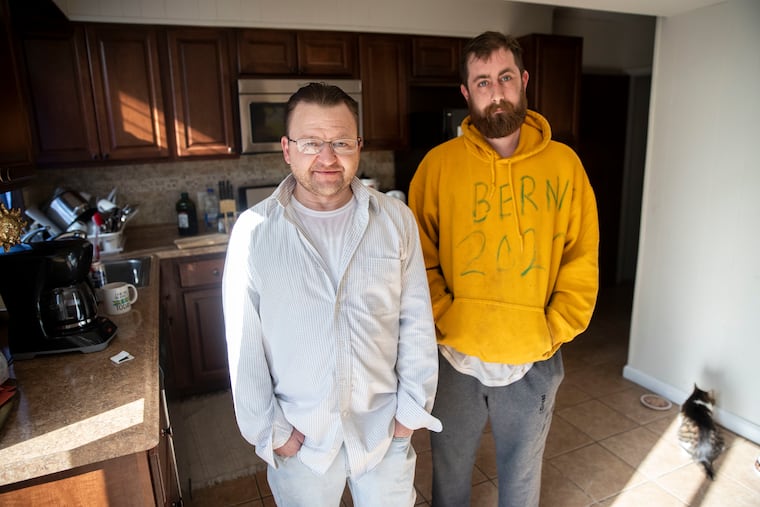How a scammer used Airbnb to lease out a Philly apartment he didn’t even own
Ross Nazimov thought he had found the perfect apartment. Then, the cleaning crew showed up, followed by the real landlord, and then the police.

Ross Nazimov thought he had found the perfect apartment: a room in a brand-new two-bedroom unit in Fishtown, with a roommate who assured him he was rarely home. In November, he paid a $500 deposit, moved in, unpacked his few possessions, and began snapping photos of the place, astounded by his good luck.
But there were warning signs: the empty fridge, the bare cabinets. “I was getting a bad feeling,” he said. “But I was also starting to get very excited, because it was a very nice place.”
Then the cleaning crew showed up and asked what he was doing there — followed by the real landlord and, soon after, the police.
Just as the conversation was growing tense, a U-Haul pulled up carrying two more people, Nick Gardner and Natasha Pittman, who had rented the same room as Nazimov. That’s when the landlord and his three new, unwitting, and as yet nonpaying tenants figured out they’d all fallen victim to a conman who was long gone.
It turned out they’d been caught up in a scam that’s popping up on crime blotters from Fort Lauderdale, Fla., to Kansas City, Mo., and Vancouver, British Columbia. In a more sophisticated grift than the average fake rental listing made with copied photos, someone had rented the place for two nights on Airbnb — and then posted an ad on Craigslist as if he owned the place.
Nazimov was out his last $500. “I would have been homeless at that point,” he said. His would-be roommates lost $800. And the landlord, George Ryzinsky of the Southampton-based property management firm DAN Housing, was also in a difficult position, with new Airbnb tenants due that evening and the prospect of a protracted battle in landlord-tenant court.
“You can’t just change the locks, even if you have a squatter,” Ryzinsky said. The police who arrived at the scene advised him to “work it out," he said.
As to who’s behind the scam, Ryzinsky said it was no great mystery to him. He could see the name and photo of the person whose Airbnb account was used: Tamiah Holmes, a Temple University student.
But Holmes said she, too, was a victim. “I had no part of it whatsoever," she said. She said Travonne Williams, a former romantic interest, had stolen her identity to create the account and perpetrate the fraud, leaving her to face the consequences and dispute the Airbnb charges to her credit card.
Airbnb Inc. didn’t respond to a request for comment.
And Williams, whose cell phone number was listed on the Airbnb account created in Holmes’ name, had a different story. He, too, said that he was blameless, and that Holmes told him she owned the property and asked him to help rent it out.
“I was just as concerned as they were when they lost their money,” he said, adding that he had offered to take them into his own home. (Gardner said he declined the invitation.)
Williams introduced himself to the tenants as William Maxwell. He said he lived at the property with his wife, a medical student, who was asleep in the back bedroom while he was showing the place, according to Gardner and Nazimov.
The day after a reporter called Williams in January, that cell phone number was no longer in service.
Ryzinsky believes the scammers count on the fraud being too low-level for police to pursue, or for legal action to be worthwhile.
“The police do not spend enough time to catch these people," he said. "There is a way to do it that has to come from the financial part of the operation.”
A Philadelphia police spokesperson said an investigation is ongoing, though Nazimov said he only received a call from a detective in mid-January after a reporter inquired about the case. The spokesperson said the police have no way to track how common reports of similar rental frauds may be. The detective handling the case said she couldn’t comment on it.
Since November, Nazimov has repeatedly pleaded with Wells Fargo to cancel his cashier’s check, without success. A spokesman said the bank “is obligated to pay the check ... even if there is a later dispute between the person who purchased the check and their payee.”
In the end, Ryzinsky quickly moved the three duped tenants to a house he owns in Oxford Circle that had been vacant — and that was actually within their price range. Even so, he said, he’s just barely covering his costs on the property.
He said other clients of his have experienced similar frauds. He feels relatively lucky that in this case, he discovered the problem right away.
Since then, he’s taken precautions on Airbnb, including avoiding locals, who he figures are either throwing a party or up to no good. And, he said, “we no longer take anybody with zero reviews.”